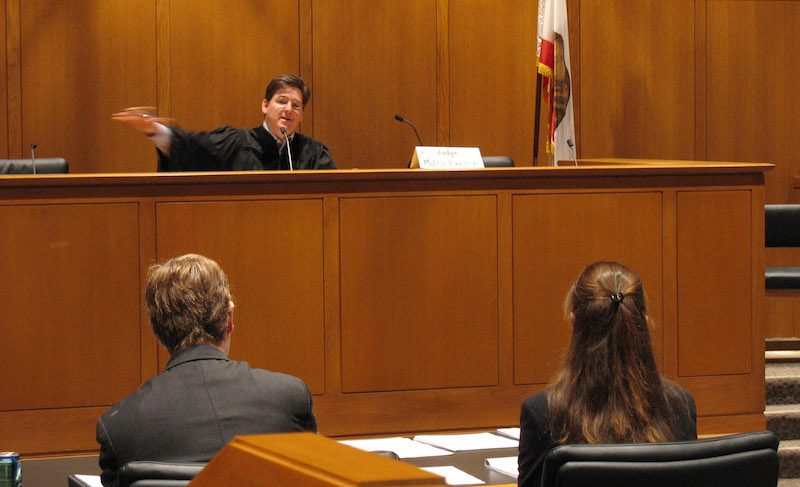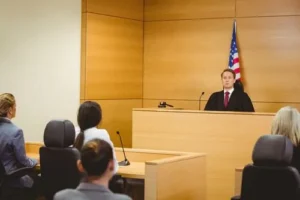Can You Go to Jail at a Plea Hearing? A plea hearing is a crucial stage in a criminal case where the defendant either pleads guilty or not guilty. Regarding the defendant’s willingness to take responsibility and the rationale behind accepting a guilty plea, the judge may pose inquiries.
The ability to file a guilty plea may not be immediately available due to various circumstances and additional criteria. To find out more about plea hearings and how they may affect your case going forward, continue reading.
Is It Possible To Go To Jail During A Plea Hearing?
A plea hearing is a complex process that considers various factors that determine if someone is eligible for jail. But generally speaking, two factors can raise the prospect of jail time during a plea hearing.
The prosecutor’s request comes first, and the judge’s ultimate ruling comes second. As part of the conditions of your plea agreement, the prosecution may ask to have you placed back in custody. However, the judge has the authority to impose a sentence that includes incarceration. The only possible outcomes in this situation are if you willingly surrender or if you are arrested by the authorities.
What Occurs During a Plea Hearing?
A court meeting known as a plea hearing usually occurs a few days after your arrest. Additionally, it’s the last phase of the legal process before you receive a punishment.
A judge will likely conduct the plea hearing and interrogate you regarding the specifics of your case and your desire to enter a guilty plea. During the hearing, you’ll probably have the chance to speak on your behalf, so be sure you’re ready to address inquiries on the specifics of your case and what you’re willing to do in exchange for a plea deal.
Normally, a plea hearing occurs a few weeks after the original court appearance. Even if you can attend by phone or video conference, it is preferable to be there in person. The hearing may differ depending on the court, the judge, and the charges.
After hearing arguments from the prosecution and defense, the judge accepts the plea and sentences the defendant. The judge may inquire as to the reasons for the plea change.
Why Would You Go To A Plea Hearing?
Finalizing a plea bargain is typically the goal of plea hearings. At this point, the court will assess your sincerity in taking ownership of your acts and agreeing to a particular punishment in exchange for a lower charge or other advantages.
You can also be asked to submit a guilty plea at this stage. It’s likely that you will not have the opportunity to enter a plea deal or not enter a guilty plea at this stage, so it’s imperative that you show up for your hearing and get this issue resolved as soon as possible.
Attending a plea hearing may be for a variety of reasons because they can vary so much. But ultimately, the purpose of a plea hearing is to seal your plea agreement. You should be ready to go into great detail on the conditions of your plea deal.
If you wish to revoke your not-guilty plea, you might also wish to show up at a plea hearing. This is something you might want to do if more evidence becomes available or if you felt under duress to enter a guilty plea during a previous hearing.
You must appear at the hearing if you wish to modify your plea to one of no contest. In addition to likely asking you a few questions to ensure that this is all voluntary, the judge will likely ask you to explain why you are altering your plea. If a plea to no contest is being entered under duress, a judge is unlikely to accept it.
What Would Happen If You Accepted My Modified Request?
Entering a new plea typically prevents the ability to call witnesses or submit evidence at the hearing. Use this chance to confirm that you are making a free choice and are not under any duress to enter a guilty plea. As soon as you’ve decided, please inform the court so that the appropriate preparations can be made for your sentence hearing.
To prepare for a plea hearing, consult the court clerk or ask your attorney about the proceedings. Bring a notepad and any relevant documents for the judge’s review. If you change your plea, the judge may ask for an explanation. If the prosecution agrees to modify the charges, the case will proceed as if you had never been charged with the initial crime.
What Takes Place If You Choose to Remain Not Guilty?
Upon receiving a criminal charge, the court will set up a plea hearing to decide whether to proceed with a trial or accept a guilty plea. Together with speaking with the prosecution, the accused will have the chance to consult with their attorney and consider accepting a plea deal.
The judge will determine your sentence if you choose to enter a guilty plea. A jury of your peers will decide your sentence if you want to proceed with a trial. When you first arrive in court and are asked if you would want to enter a plea of guilty, not guilty, or no contest, the plea hearing officially starts.
Both parties may now present their cases to the judge and request a sentence agreement. Should the parties fail to reach a mutually acceptable sentence, each party may present their case to the judge.
If you choose not to plead guilty, you may still be able to negotiate a plea agreement with the prosecution.
Before a case is tried, negotiations are frequently held during the discovery phase. You will have to go to trial if a plea agreement cannot be struck and the prosecution refuses to drop the charges against you.
If you choose not to enter a fresh plea and proceed with a trial, a new trial date will probably be scheduled for the future. You should be ready to wait several months before your case appears in court because it may be postponed multiple times before it goes to trial.
In Summary of Can You Go to Jail at a Plea Hearing:
Attending a plea hearing is a crucial step in resolving a criminal case if you are facing charges. However, you should prepare yourself for the various outcomes before attending a plea hearing. You might wish to talk to your lawyer beforehand about the possible results.
Keep in mind that plea negotiations are frequently only the start of a drawn-out legal process. As the court schedules your trial and decides your case, be ready to wait.



